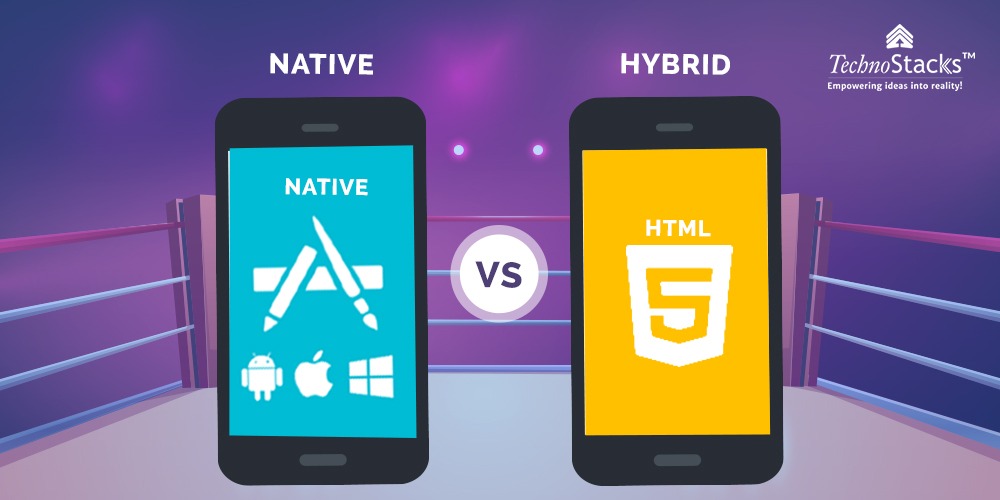Native App vs Hybrid App Development: The Real Comparison
The usage of the smartphone market has increased a lot in recent years and native app vs hybrid app development is also the most debate topic for app developers in present times.
Last year, the share of the mobile phone traffic had risen to 52.2%, and this is enough to understand how useful as well as compelling the app building is.
The availability of affordable smartphones and the internet has made an enormous difference for the people out there. People started depending on the smartphones making it difficult for the developers to choose whether native app development is good for crafting the app or hybrid app development.
Let’s compare both native and hybrid app development and decide which one among them is good for app development.
Native App Development Overview
The native mobile app development is a process that helps in creating apps for iOS, Windows, Android, and Blackberry. The apps developed on native platform will work only on a particular operating system. This means the developer should create different versions of an app for different systems. The native apps provide optimized performance and they take advantage of the latest technology such as GPS.
The developers write code in Swift or Objective-C for iOS applications, Java for Android Native applications and C# for Windows. The construction of app, design, graphic styles, typography, visual effects, data entry, etc. everything varies between the operating systems. The native apps are capable of accessing the features that are present in the mobile quickly like microphone, camera, location detection, etc. They are quick to send the push notifications too. Some of the famous native apps that are available in the market are Pokémon Go, Waze, Twitter, etc. The native apps give much better user experience when compared to hybrid apps.
The pricing for native app development may vary from $5000 to $250,000 depending on the complexity of the app.
Hybrid App Development Overview
In Hybrid app, one app will be created for different platforms. These means be it iOS, Android, Windows or Blackberry, only one app is enough to serve all the purposes.
The hybrid apps are a combination of native apps and web apps together. A single product is enough to work on all the operating systems. These apps may look and feel like a native application, but the fact is that these apps are run by a website.
The languages that are usually used in hybrid app development are CSS, HTML5, and JavaScript. It is simply a web-based app that is put in the native app shell and connected to the device’s hardware.
These hybrid apps are cost-effective and almost all the startups and people who are on a stiff budget usually opt for hybrid app development.
The cost of developing hybrid apps is less when compared with native apps. One can get an app at a price of $4800 to 100,000 depending upon the complexity and nature of the app.
Let’s check here hybrid app vs native app pros and cons.
Native App Advantages
-
- Smooth Performance
In native mobile app development, the programmers write different codes for different operating systems with respective programming languages. As the app is made only for a specific operating system, it works smoothly.
-
- Speed
The application is optimized according to the requirements of a specific platform. This way it will achieve higher marks in both speed and performance. While developing native apps, programmers consider every aspect. They make sure that the app is perfect for the specific operating system.
-
- User Experience
User experience matters a lot and the native apps give smooth and intriguing user experience. The feel and experience are way better in native apps when compared to hybrid ones.
-
- Flexibility
The native apps provide access to various inbuilt devices such as GPS, camera, calendar and some other functions of the mobile. The hybrid apps have certain limitations and it cannot access certain features of mobiles.
Native App Disadvantages
-
- Development Cost
The developers usually have expertise in developing apps for only a project. This way if you need an app for various types of platforms, you have to get numerous developers working on them. This scenario will surely increase your budget.
-
- Development Time
Native apps require more time for development when compared to hybrid apps. Creating an app according to the requirements of one particular operating system is not easy.
Hybrid App Advantages
-
- Decreased Cost of Development
If you are tight on budget, then hybrid app development is the best choice for you. There is no need for you to hire multiple programmers to work on various OS platforms.
-
- Maintenance
The hybrid apps are web applications in a native nutshell. You will be able to update the content as many times as you want, and it needs very low maintenance.
-
- Less Time for Development
The hybrid native apps don’t take a lot of your time during development. You will be able to get the app into the market in very less time.
Hybrid App Disadvantages
-
- Poor Performance
The Hybrid apps add an extra layer between source code and target mobile platform likely the hybrid mobile framework. This can result in performance loss.
-
- Difficulty in Debugging
The extra layer causes some big issues with the debugging too. The developers have to rely on the framework itself to work nicely on the targeted operating system without introducing any kind of bugs in the app.
-
- User Experience
The user experience lags in hybrid app development.
Now check below the quick comparison and the difference between native app and hybrid app.
Native vs Hybrid App Comparison
| Aspect | Native | Hybrid |
|---|---|---|
| Languages | Native only | Native and Web / Web only |
| User Interface | Rich and attractive interface | It won’t give a fully native experience for the users due to the usage of web technology |
| Platforms | Single for each platform | Multiple |
| Access to native APIs | High | Moderate |
| Performance | The apps perform faster and highly reliable due to their design | Usually slower |
| Updating | It supports several versions like complex server part. The whole app must be updated to see changes. The app code is updated through the market. |
The apps will be updated regularly from the App store and there is no need of the market for updating the app code. |
| Security | The attacks occur in insecure data storage, weak implementation of SSL, unlimited leaks of data, the reverse engineering, and code injection. | The attacks occur in insecure data storage, weak implementation of SSL, unlimited leaks of data, the reverse engineering, and code injection. Apart from them, the additional layer leads to some problems. |
| Compatibility with other apps present on the device | Higher | Less |
| Ecosystem | It has a rich ecosystem of tools | It is limited by the developer’s ecosystem of community solutions and the third party plugins. |
| Navigation | It has built-in navigation systems | The WebView will help in combining existing content present on the Web with the native app capabilities. |
| Frameworks | API provided by OS | Rubymotion (Ruby), React Native, PhoneGap (on HTML5, CSS, JavaScript),Sencha Touch (on HTML5, CSS, JavaScript). |
| Stores | Available: Windows Store, Apple’s App Store, and Play Store |
Available: Microsoft Windows Store, Google Play, Apple App Store. |
| Developer’s learning ability | The developers should have expertise in developing apps on a particular OS, if they don’t have experience then it will take time to study and understand development for each platform. | The developers can learn this easily as there is no need to learn the development of apps for each platform. |
| Time of market launch | It takes a lot of time to launch one app in the market. Usually, six months is required for sure. | This requires very less time, usually less than 6 months. |
| Development cost | It is expensive | It is cheaper and people who have a tight budget can go with this. |
| Cash allocation | This requires separate financing for each platform. | The financing will be done in one stream. |
| Device specific features | High availability | Moderate |
| Internet connection | The internet connection depends on the app. The native apps that usually need internet connection are 1) API-client apps 2) Updating the apps from the market |
Almost all the apps need connection. The web part needs to be renewed from time to time, and this requires internet. |
Key Takeaways
Both the apps have their fair share of pros and cons. But the one thing that can be said is native app development is better than hybrid app development. Though hybrid apps are helpful for people who are on a tight budget, they are not preferable if you have a reasonable budget. The users are the ultimate decision-makers and you have to provide them with an excellent interactive app with amazing UI/UX which is possible with Native apps only.
Technostacks is a top mobile app development company in India and if you are looking for a trusted app development firm for your business project requirement then contact us now.








